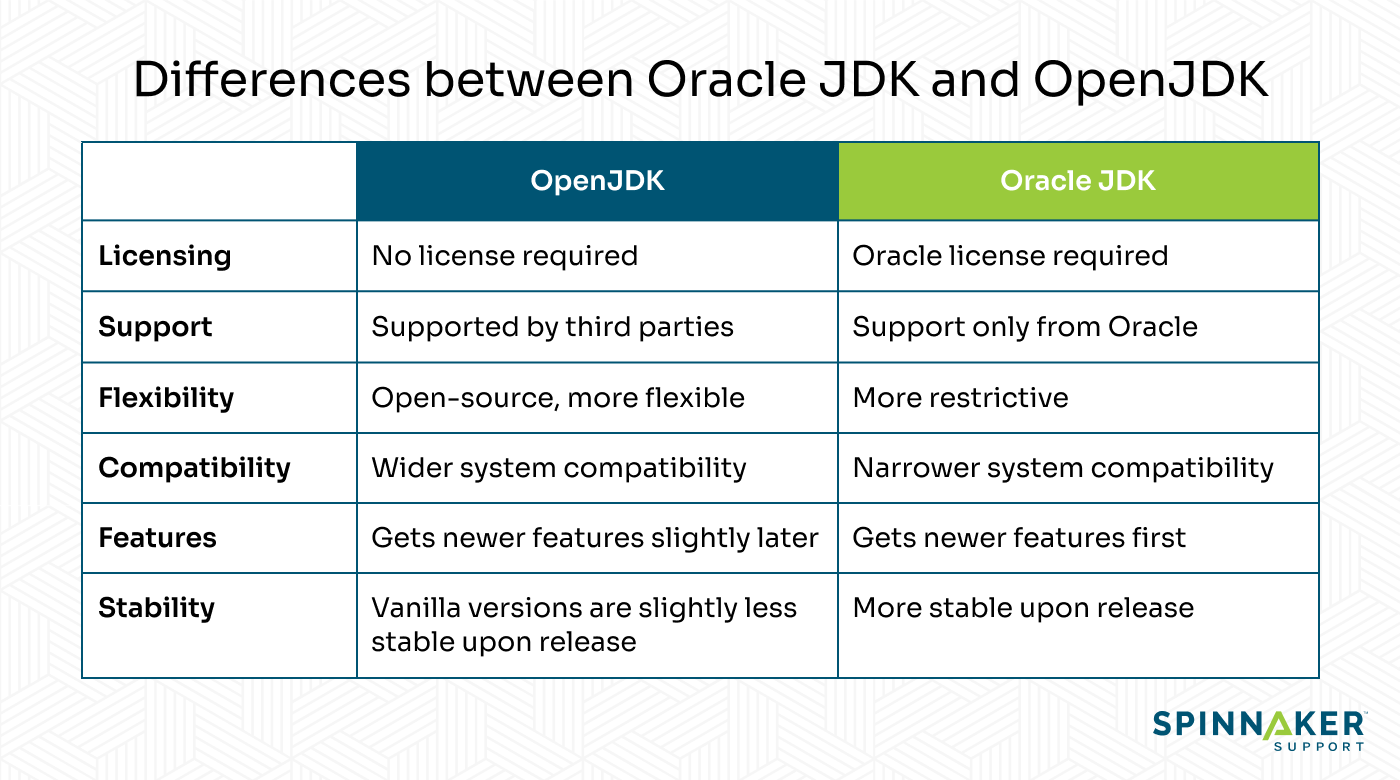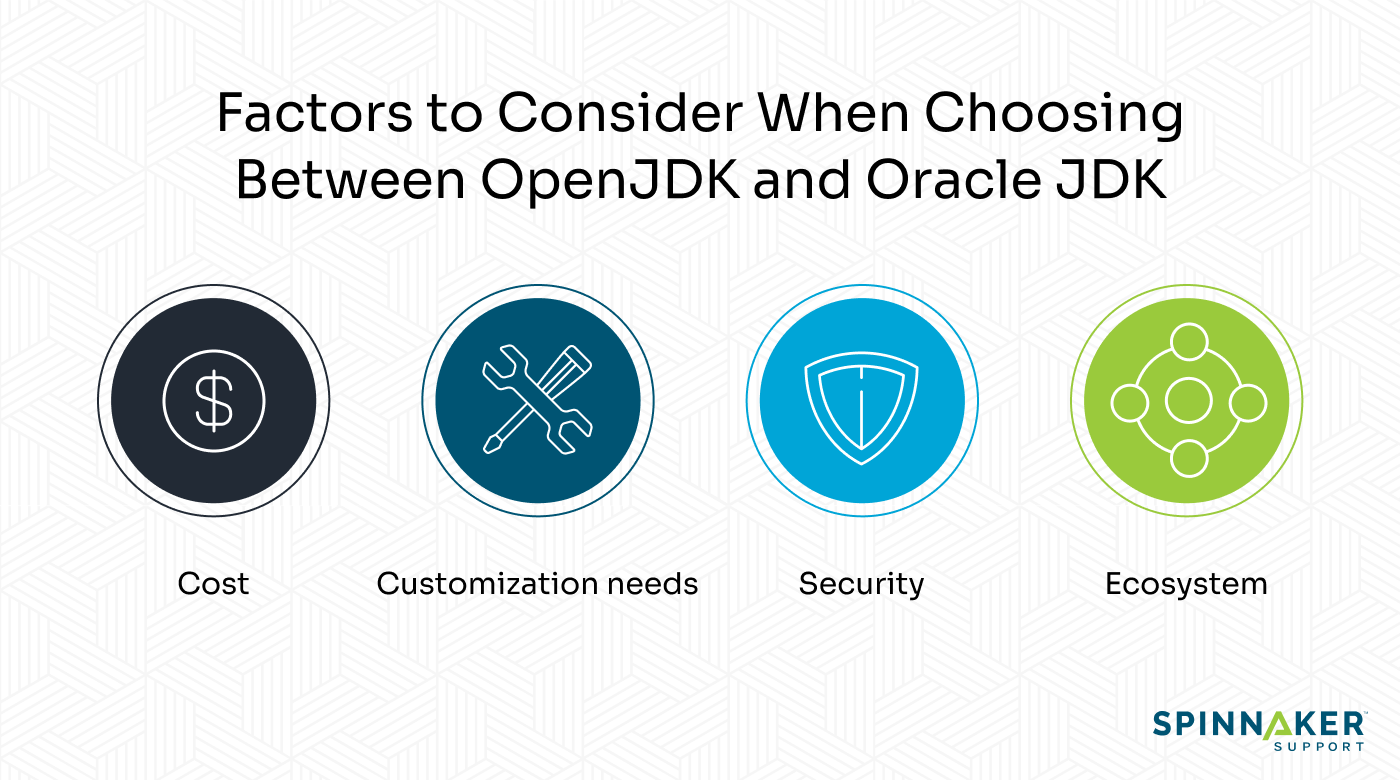When it comes to enterprise Java SE development, choosing the right JDK is crucial for delivering high-performance, scalable, and secure applications.
Two of the most popular options in this category are OpenJDK and Oracle JDK, both are robust in their own ways. Considering how much a JDK affects the developer experience, choosing the right one from the start is crucial.
This Oracle JDK vs OpenJDK article will provide an in-depth analysis for an enterprise audience. Find out what features they offer, where they differ, and the factors to consider when making your pick.
Oracle JDK vs OpenJDK: What are they?
A Java Development Kit (JDK) is a set of tools and software components that allows developers to build and run Java applications. It includes a Java Virtual Machine (JVM), a Java Runtime Environment (JVM), APIs and libraries, a debugger, and a compiler.
Java became open-source in 2006, and OpenJDK was released in 2007. In 2009, Oracle acquired Java in its purchase of Sun Microsystems, and released Oracle JDK in 2011.
Fortunately, OpenJDK remained free and open-source after the acquisition. However, because Oracle now owns the rights to Java, it often refers to it in official documents as “Oracle OpenJDK.” You should be aware of this naming convention to avoid confusion when comparing the two.
Both JDKs are still actively going today, both more than 20 major versions in, with similar release schedules: rapid release every six months, with a long-term support (LTS) version every two years. OpenJDK gets new releases first, and Oracle uses them to refine its proprietary JDK (e.g., by smoothing out bugs that early adopters catch).
As an open-source project, the development of OpenJDK is in the hands of contributors that range from volunteer individuals to trillion-dollar corporations, including:
- Oracle
- Open-source software communities
- IBM
- Red Hat
- Azul
- Apple
- Microsoft
- SAP
- Amazon
In contrast, Oracle is the only company that works on Oracle JDK, and the project is closed-source. That’s where the differences between the two begin, but it’s hardly where they end.
How are Oracle JDK and OpenJDK different?
Functionally, OpenJDK and Oracle JDK are identical — any differences they have are grafted on for the sake of the Oracle Corporation’s bottom line.
This, paired with Oracle’s deliberately confusing naming system, makes it easy to lock yourself into a costly commitment if you don’t know how to distinguish between the two.

Aside from how they’re developed, here are the major differences between Oracle JDK and OpenJDK.
1. Licensing
The biggest difference between OpenJDK and Oracle JDK is in their licensing structures, which determine their costs.
OpenJDK is free and open-source, made available under version 2 of the GNU General Public License (GPLv2). Under these terms, anyone can download, modify, and redistribute it for free, even commercially.
Oracle has deliberately made its proprietary JDK’s licensing policy complex. The No-Fee Terms and Conditions (NFTC) license, for example, allows free access even for commercial use. However, you can’t decompile, reverse engineer, disassemble, or modify the source code without a commercial license.
Under these licensing implications, you’re effectively using a weakened version of OpenJDK, with barriers that you have to pay to remove. The licensing conditions get even worse as you move up to the Oracle Technology Network (OTN) and My Oracle Support agreements.
To make the licensing even more complicated for end users, Oracle stated that Oracle Java 17 is free to use if and only if you don’t apply any vulnerabilities after September 2014.
2. Support
As it’s open source software, support on the OpenJDK project comes from the development community. However, you can enlist the services of a third-party support partner like Spinnaker Support to get professional engineers on your side.
We’ve established that the Oracle Java development toolset is identical to OpenJDK, so the thing you’re actually paying for is first-party support.
Unfortunately, between slow response times, late security updates, and potential software audits, these services might not be worth the premium.
Comparatively, Spinnaker Support gives you a 24/7/365 team with an average response time of five minutes — within 15 minutes guaranteed — at a fraction of the cost.
3. Flexibility
OpenJDK is open-source while Oracle JDK is closed. This makes the former a lot more flexible in terms of configuration and customization, far beyond what the developers could have intended.
Enterprise companies have taken advantage of OpenJDK’s flexibility to compete directly with Oracle.
For instance, Amazon has famously used OpenJDK to build its own free JDK called Coretto. It’s now the most popular build of OpenJDK, with a 31.35% market share, compared to Oracle JDK’s 28.75%.
4. Compatibility
Oracle has put in an effort into ensuring its JDK is compatible with many popular platforms, including different versions of Windows and macOS. It also runs on Oracle, Red Hat, Ubuntu, and SUSE Linux distributions.
OpenJDK supports a wider range of platforms, adding to its flexibility as discussed above. On top of the ones listed above, it also runs on IBM AIX, as well as Alpine and Fedora Linux.
5. Features
While OpenJDK usually comes out first, new feature releases like Flight Recorder, Application Class-Data Sharing, and Java Mission Control have traditionally appeared in Oracle JDK first.
However, at the time of release, these features were nice-to-haves rather than essentials, and they made their way to OpenJDK shortly after anyway.
OpenJDK’s flexibility allows developers to introduce their own implementations of these features if they really feel like they’re missing out.
6. Stability
New OpenJDK versions release first, making them essentially test builds for new versions of Oracle JDK. For this reason, new Oracle JDK versions are generally more stable upon release.
That said, the teams behind OpenJDK usually get new releases stable very soon after release, and a third-party support provider could expedite that process for you.
If you’re not interested in switching to the new version after every major release or even leaving your current version after its sunset date, none of this should make a difference.
Should you pick Oracle JDK or OpenJDK?
Now that you know the differences between OpenJDK and Oracle JDK, you’re ready to make a decision.

Here are the factors you should consider when choosing a JDK.
1. Cost
OpenJDK is free for anyone to download and use with no restrictions. Conversely, even the “no-fee” version of Oracle JDK eventually requires a license to use.
Again, OpenJDK and Oracle JDK are the same feature-wise, so the only addition you get by paying for the latter is first-party support. It’s not a necessary expense, and you might even find it to be below your preferred standards.
By switching to a third-party support provider like Spinnaker Support, you could save as much as 60% in support costs, all while gaining access to industry-leading expertise.
2. Customization needs
Due to its open-source nature, you can configure OpenJDK to fit your needs. This is suitable for teams that work with nonconventional processes or want more functionality out of their JDK.
Oracle JDK is closed-source, so you don’t get the option to customize or extend its functionality beyond what the vendor intended. If there’s, say, a tool you want to connect to that it doesn’t natively support, there’s nothing you can do.
The threat of vendor lock-in might explain the rise in popularity of alternative builds like Amazon Coretto, Azul Zulu, and Eclipse Adoptium.
Like all these companies, you can also configure your own build of OpenJDK. With a partner like Spinnaker Support, you can offload the work of setting up and managing your JDK while remaining in control.
3. Security
Software companies as large as Oracle often prioritize threat and vulnerability management based on what poses a risk to most of their customers.
If a security issue you’re facing is serious but isn’t a priority for the vendor, you’re vulnerable until a patch eventually rolls out (if ever).
OpenJDK opens the door to third-party support, where you get a security team that stays on top of your systems. Spinnaker Support offers proactive vulnerability management services to protect your systems and resolve issues before they can escalate.
4. Ecosystem
Evaluate your tech ecosystem to determine which JDK would be most compatible with your existing software development environment.
As we discussed earlier, OpenJDK is compatible with a wider variety of platforms than Oracle JDK. You can also configure it to your liking to make it work with a system or tool that it doesn’t support out of the box.
Under Oracle’s licensing terms, certain key components of your IT systems might mean you get charged more with Oracle JDK. For instance, you might run into additional costs if you run virtual machines as part of your Java development workload.
Common FAQs about Oracle JDK vs OpenJDK
Still have questions about Oracle JDK and OpenJDK? Here are some answers to frequently asked questions.
Is Java 17 the same as JDK 17?
Java is not the same as a JDK. Java is a programming language, whereas the JDK is its software development kit (i.e., a collection of tools programmers use to work with the language).
Because you can’t have one without the other, they’re always released at the same time. For example, both Java 17 and OpenJDK 17 came out in September 2021.
Which version of OpenJDK is best?
The best version of OpenJDK is whatever the most recent LTS release is at the time. The latest vanilla version should have all the best features, security, and stability available for contemporary Java developers.
However, if you’re on an older version of OpenJDK and you don’t want to or can’t move to a newer version, third-party support can extend its lifespan for as long as you need it. From break/fix services to security patches, you can stay modern with legacy software.
Is Oracle JDK faster than OpenJDK?
Oracle JDK is not faster than OpenJDK. Oracle builds its own JDK from OpenJDK, so there’s no technical difference between the two. The only instance where you might notice any real performance difference is if the version of OpenJDK in question is older than the version of Oracle JDK.
If you’re an early adopter of the latest OpenJDK release, especially before it hits General Availability, you might notice some performance issues, but those usually get smoothed out with time.
Transform your enterprise Java development with OpenJDK and third-party support
OpenJDK and Oracle JDK are functionally identical, but the latter comes with a steep price tag. It’s also closed-source, meaning you can’t configure it as extensively as you can OpenJDK.
Moreover, Oracle customers are vulnerable to software audits, which often carry hefty noncompliance fees if you don’t have a reliable audit defense partner on your side.
By pairing OpenJDK with third-party support, you can slash costs considerably and take full control of your development tools, all without sacrificing functionality.
If you’re ready to move on from Oracle JDK, contact us to discuss your migration to OpenJDK with third-party support from Spinnaker Support.